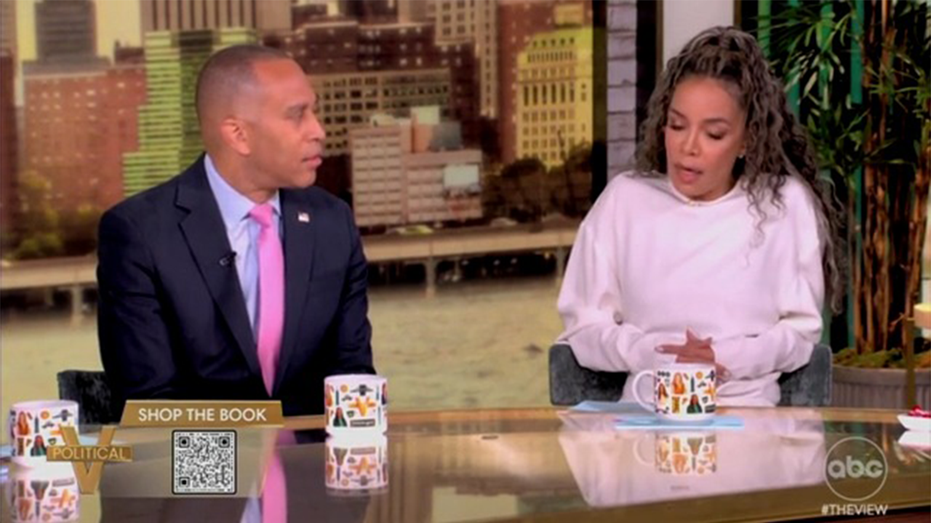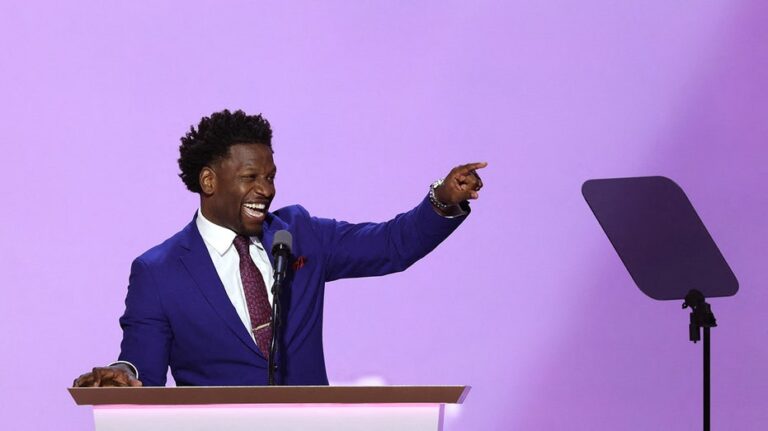
House Minority Leader, Rep. Hakeem Jeffries, D-N.Y., pushed back against the idea that “racism and misogyny” drove voters to support President-elect Trump this election during a Friday appearance on “The View.”
Jeffries was asked by co-host Alyssa Farah Griffin what lessons his party needed to take away from this election, as members of his party continue to play the “blame game” for Vice President Kamala Harris’ defeat. Jeffries argued that the primary takeaway from this election was that the high cost of living had put a huge burden on most Americans and made the American dream unattainable.
“[T]hat basic contract between everyday Americans and the country, which is that if you work hard and play by the rules, you should be able to provide a comfortable living for yourself for your family, purchase a home, educate your children, have access to health care, go on vacation every now and then and one day be able to retire with grace and dignity. That’s the American dream, but for far too many people it’s out of reach. That shouldn’t be a Democratic or Republican issue. That’s an American issue that we should all address together,” he continued.
Co-host Sunny Hostin told Jeffries she was still “struggling” to grasp how voters chose Trump over Harris. She asked him if he believed sexism and racism also played a role.
‘THE VIEW’ HOSTS CLASH OVER WHETHER RACISM, SEXISM PLAYED ROLE IN TRUMP ELECTION VICTORY
“Something that I’m still struggling with, and I’d love to hear your thoughts on, is how did a convicted felon resonate more with Americans than a hyper-qualified woman of color? Do you think that racism and misogyny played any part in this election?” she asked.
Jeffries doubled down on his answer that the economy was the dominant factor in this election.
“I think that Vice President Harris was eminently qualified, and I supported her with everything that I had, and I think so many Americans did. It was a close election at the end of the day. Didn’t break in her direction. I think we all are going to unpack as part of our after-action analysis. How did this happen? Where did we fall short? I do think that the emerging lesson, separate and apart from reasons maybe connected to race and misogyny, is that the economy was the dominant thing for a lot of folks,” he responded.
“Particularly when you consider that in many communities of color, there was movement away from the Democratic candidate and toward the former president,” he continued. “But we— I think we have to unpack it all and it’s understandable that there’s great disappointment among a lot of people. You know, she represented tremendous hope for a new day in the United States of America. But Shirley Chisholm took a step forward, Hillary Clinton took a step forward, now Kamala Harris is taking a step forward,” he said.
MEDIA FIGURES CLAIM AMERICANS WEREN’T ‘READY’ TO PICK A BLACK WOMAN FOR PRESIDENT: ‘LET’S BE HONEST’
Hostin has repeatedly argued that voters’ own sexism and racism against Harris, the first female, mixed-race presidential candidate, played a role in the election.
Just this week on “The View,” Hostin clashed with Griffin over the issue, after Hostin claimed that it was “an uncomfortable, inconvenient truth” that racism contributed to Harris’ defeat.
“As a country, it’s very difficult for people to believe that racism and misogyny, they’re just alive and well. I think that we don’t want to think that about ourselves, our neighbors, our friends, but it’s— my lived experience tells me that it does still exist, even if your lived experience doesn’t tell that it exists and, you know, the facts support that,” Hostin said, pointing to a graph that showed “a clear racial divide” in who voted for Trump as opposed to who voted for Harris.
CLICK HERE FOR MORE COVERAGE OF MEDIA AND CULTURE
“It’s very clear. It’s not only clear by race, but it’s also clear by education, and so the notion somehow that that is not true — this is by education. Those who attended a college voted for her at a higher degree than those that didn’t,” Hostin continued. “I’ve said that before, and there was so much backlash because I think it’s an uncomfortable, inconvenient truth about this country.”
After the election, Hostin also blamed “sexism and misogyny” for why more Latino voters supported Trump this election.
Fox News’ Hanna Panreck contributed to this report.
House Minority Leader, Rep. Hakeem Jeffries, D-N.Y., pushed back against the idea that “racism and misogyny” drove voters to support President-elect Trump this election during a Friday appearance on “The View.”
Jeffries was asked by co-host Alyssa Farah Griffin what lessons his party needed to take away from this election, as members of his party continue to play the “blame game” for Vice President Kamala Harris’ defeat. Jeffries argued that the primary takeaway from this election was that the high cost of living had put a huge burden on most Americans and made the American dream unattainable.
“[T]hat basic contract between everyday Americans and the country, which is that if you work hard and play by the rules, you should be able to provide a comfortable living for yourself for your family, purchase a home, educate your children, have access to health care, go on vacation every now and then and one day be able to retire with grace and dignity. That’s the American dream, but for far too many people it’s out of reach. That shouldn’t be a Democratic or Republican issue. That’s an American issue that we should all address together,” he continued.
Co-host Sunny Hostin told Jeffries she was still “struggling” to grasp how voters chose Trump over Harris. She asked him if he believed sexism and racism also played a role.
‘THE VIEW’ HOSTS CLASH OVER WHETHER RACISM, SEXISM PLAYED ROLE IN TRUMP ELECTION VICTORY
“Something that I’m still struggling with, and I’d love to hear your thoughts on, is how did a convicted felon resonate more with Americans than a hyper-qualified woman of color? Do you think that racism and misogyny played any part in this election?” she asked.
Jeffries doubled down on his answer that the economy was the dominant factor in this election.
“I think that Vice President Harris was eminently qualified, and I supported her with everything that I had, and I think so many Americans did. It was a close election at the end of the day. Didn’t break in her direction. I think we all are going to unpack as part of our after-action analysis. How did this happen? Where did we fall short? I do think that the emerging lesson, separate and apart from reasons maybe connected to race and misogyny, is that the economy was the dominant thing for a lot of folks,” he responded.
“Particularly when you consider that in many communities of color, there was movement away from the Democratic candidate and toward the former president,” he continued. “But we— I think we have to unpack it all and it’s understandable that there’s great disappointment among a lot of people. You know, she represented tremendous hope for a new day in the United States of America. But Shirley Chisholm took a step forward, Hillary Clinton took a step forward, now Kamala Harris is taking a step forward,” he said.
MEDIA FIGURES CLAIM AMERICANS WEREN’T ‘READY’ TO PICK A BLACK WOMAN FOR PRESIDENT: ‘LET’S BE HONEST’
Hostin has repeatedly argued that voters’ own sexism and racism against Harris, the first female, mixed-race presidential candidate, played a role in the election.
Just this week on “The View,” Hostin clashed with Griffin over the issue, after Hostin claimed that it was “an uncomfortable, inconvenient truth” that racism contributed to Harris’ defeat.
“As a country, it’s very difficult for people to believe that racism and misogyny, they’re just alive and well. I think that we don’t want to think that about ourselves, our neighbors, our friends, but it’s— my lived experience tells me that it does still exist, even if your lived experience doesn’t tell that it exists and, you know, the facts support that,” Hostin said, pointing to a graph that showed “a clear racial divide” in who voted for Trump as opposed to who voted for Harris.
CLICK HERE FOR MORE COVERAGE OF MEDIA AND CULTURE
“It’s very clear. It’s not only clear by race, but it’s also clear by education, and so the notion somehow that that is not true — this is by education. Those who attended a college voted for her at a higher degree than those that didn’t,” Hostin continued. “I’ve said that before, and there was so much backlash because I think it’s an uncomfortable, inconvenient truth about this country.”
After the election, Hostin also blamed “sexism and misogyny” for why more Latino voters supported Trump this election.
Fox News’ Hanna Panreck contributed to this report.



